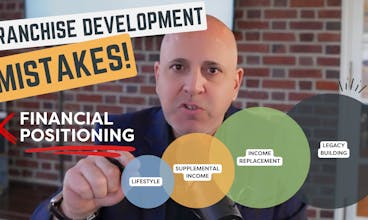When you franchise your business you'll be taking the legal steps necessary to become a franchisor, comply with federal and state franchise laws and sell franchises to individuals who become franchisees that develop and open new locations under your brand and following your systems. As a franchisor there are significant franchise compliance obligations that you must satisfy and, to legally franchise your business, follow these steps:
- Prepare Your Franchise Disclosure Document (FDD)
- Protect Your Trademarks
- Establish Your Franchise Company
- Develop Your Operations Manual
- Issue, Register, and Disclose Your FDD
Beyond legal steps, access our Ultimate Guide to Franchising Your Business to learn everything about franchising your business and whether or not franchising is right for you.
1. Prepare Your Franchise Disclosure Document (FDD)
The Franchise Disclosure Document (FDD) is a pre-sales disclosure document that franchisors must disclose to prospective franchisees before offering or selling a franchise or receiving any fees. The purpose of the FDD is to provide prospective franchise buyers with information about their potential franchise investment as mandated by the Federal Trade Commission’s Franchise Rule and provide a complete overview of the legal agreements and legal relationship between you and your future franchisees.

The 23 disclosure sections / items that must be disclosed in every FDD, include:
- Item 1 - The Franchisor, Parents, Predecessors, and Affiliates
- Item 2 - Business Experience
- Item 3 - Litigation
- Item 4 - Bankruptcy
- Item 5 - Initial Fees
- Item 6 - Other Fees
- Item 7 - Estimated Initial Investment
- Item 8 - Restrictions on Sources of Products and Services
- Item 9 - Franchisee's Obligations
- Item 10 - Financing
- Item 11 - Assistance, Advertising, Computer Systems and Training
- Item 12 - Territory
- Item 13 - Trademarks
- Item 14 - Patents, Copyrights, and Proprietary Information
- Item 15 - Obligation to Participate in Actual Operation of the Business
- Item 16 - Restrictions on What the Franchisee May Sell
- Item 17 - Renewal, Termination, Transfer, and Dispute Resolution
- Item 18 - Public Figures
- Item 19 - Financial Performance Representations
- Item 20 - Outlets and Franchisee Information
- Item 21 - Financial Statements
- Item 22 - Contracts
- Item 23 - Receipts
Under the federal Franchise Rule, the FDD must be disclosed by you to prospective franchisees not less than14 days before signing a franchise agreement or accepting a franchise fee. The FDD must be updated not less than annually, within 120 days of your fiscal year-end and, in certain instances, earlier when material changes occur.
2. Develop an Operations Manual
When you franchise your business, as a franchisor, your franchise operations manual will serve as the how-to guide for your franchisees. The operations manual will document your training processes and include detailed information to assist your franchisees in developing and opening new franchise locations. Some of the important topics that you'll want to include in your operations manual will include:
System standards. What are the brand standards that you hold franchisees accountable to?
Methods of operation. What daily operations should franchisees adhere to?
Supply chain information. Which vendors should franchisees use to purchase ingredients or other products necessary to run their business?
Training obligations. What training is required for various positions within the business, and who provides it?
Developing, opening and operating the business. What process should franchisees follow to develop, open and operate each franchised location?
3. Register Your Trademarks
When a franchisor sells a franchise, they typically license their trademarks to the franchisee for daily use in the franchised business. Because your trademarks are the key to your brand’s success, failing to legally protect them is a step you can’t afford to miss.
When you’re getting started, it’s important to be proactive about protecting your intellectual property. Conduct trademark searches as soon as possible during the franchising process and register your trademarks with the U.S. Patent and Trademark Office as early as you can. Because trademark registration can be a complex and lengthy process, working with an experienced attorney to conduct trademark searches and initiate the registration process is a good idea.
If your trademark is not legally protectable, you may have to choose a different name for your franchise brand. Starting the trademark process early – and ensuring it’s done properly – can help prevent a legal headache when naming your business.
4. Establish a Corporate Structure
Entrepreneurs need to remember that franchising is different from small business ownership. Because of that, establishing a corporate structure for your franchise system is an important legal step in the franchising process.
A corporate structure for a franchise will typically consist of:
The current company. As a business owner, your current company is the foundation for your corporate structure.
A franchising company. In addition to your current company, establishing a franchising company is a necessary legal step for protecting your brand while selling franchises.
An IP holding company. Depending on your brand’s needs, some franchisors may establish an intellectual property holding company. Discuss this option with your franchise attorney to determine if it’s right for your business.

By establishing a corporate structure for your new franchise system, you can legally protect your existing business as well as your franchise brand. To ensure compliance with state and federal laws, make sure to work with an experienced franchise attorney when determining your corporate structure.
5. Form a Franchising Entity
As a business owner and franchisor, establishing a franchising entity can help shield your existing business from the risks associated with franchising activities.
Your new franchising entity may be owned by your current company or by a parent company. Either way, the new entity will be considered the legal franchisor and its business activities will be restricted to offering and selling franchises.
When determining the shareholders or owners of your franchise entity, remember to take into account international tax treaties, tax laws and methods for distributing income from your franchising operations to your brand’s parent company or subsidiary.
Because the legal risks associated with different types of business entities can vary from state to state, consult a franchise attorney to determine the right state to establish your franchising entity and whether to structure it as a corporation or limited liability company.
6. Open a Bank Account and Make a Deposit
Once you’ve formed a franchising entity, make sure to open a new bank account for that entity as soon as possible.
The process typically includes the following steps:
Obtain a tax identification number for the new franchising entity from the Internal Revenue Service.
Open a business bank account with your preferred U.S. banking institution.
Deposit funds to capitalize your new business.
While there is no set minimum on the amount of your initial deposit, new franchisors should be aware that in the Franchise Registration States – states that require franchisors to register their FDD with a state regulator before offering or selling franchises there – state regulators will evaluate the amount of money available in a franchisor’s bank account.
If the amount of money in your account is deemed insufficient to support a franchisee – typically, if the franchisor’s capital is low relative to the investment the franchisee is required to make – regulators may impose a financial assurance requirement on your business.
Financial assurance requirements are conditions imposed by a state regulator that restrict a franchisor’s ability to register their FDD in that state until the conditions are met. Financial assurance requirements typically include posting a bond or deferring receipt of the initial franchise fee until the franchisee’s business is open.
7. Register and File Your FDD
Per the federal Franchise Rule, franchisors are legally required to comply with federal franchise laws before legally offering and selling franchises anywhere in the U.S.
In addition to federal compliance, the Franchise Registration States and the Franchise Filing States – states that require franchisors to submit a franchise filing instead of an FDD – have supplemental laws that impose additional legal obligations on franchisors. In those states, franchisors must either register their FDD or submit specific filings with a state regulatory body before offering or selling franchises in those places. Because franchise laws can vary widely from state to state, it’s important to consult with an experienced franchise attorney before drafting or filing legal documents related to your franchise.
By taking the time to understand and comply with state and federal franchise laws before franchising your business, you can hit the ground running as a franchisor – and ensure that the road ahead is a smooth one.
If you’re ready to franchise your business, we’re here to help! Contact us to learn about our legal and franchise development services for new and emerging franchisors.








